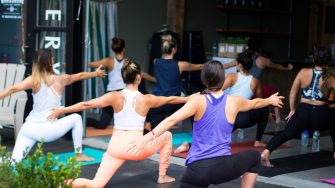
UNSW Chemical Engineering student
As we near end-of-school and final exams, it’s easy to get overwhelmed with study and neglect other aspects of life. Exercise is one of the easiest things to drop, especially thanks to COVID-19 and the fact that most sports seasons end when exams begin.
But did you know that exercise can actually help you perform better in exams (and school generally)?
Here are five reasons why you should prioritise exercise when things get busy!
1. Problem-solving
Exercise and problem-solving have an interesting relationship. While there are studies linking exercise to improved problem-solving capacity, the real benefits come from being able to apply the skills you learn during exercise to your study.
Not sure what I mean? Check out this awesome article which describes what happened when some girls in the USA did an after-school maths program which started with an hour of ballet. The results were awesome – their problem-solving ability increased by an average of 273%! As the program founder, Kirin Sinah, commented, ‘When the girls say “I don't understand how to solve this equation”, we can say, “Well, think about what you did at the dance studio downstairs.”’ Sport gives you a new perspective on problem-solving – including the self-knowledge that you can do something – which you can then apply to your academics.
2. Concentration and focus
There is lots of evidence that frequent exercise improves your ability to focus and concentrate for long periods [1,2]. The reasons for this are two-fold: exercise releases chemicals which improve your focus and stimulate brain cell growth [2]. In this way, exercise makes your study sessions more effective and targeted, so you get more bang (facts in your brain) for your buck (time)!
3. Confidence
I don’t know about you, but when I finish a hard sweat-sesh I always have this weird surge of power, like I can do anything. And it’s not just me . . . studies show that staying active is correlated with better long-term self-esteem [3]. I know how tough high school is, and being confident in yourself can be a struggle, so regular exercise can go a long way in boosting your confidence and #selflove.
4. Stress relief
In high school, it feels like there aren’t enough hours in the day to do even half of your homework and get a decent night’s sleep. Pile on an endless stream of tests and assignments and it’s no wonder high school is super stressful! Exercise can help you deal with this. When you’re physically active, your brain releases stress-relieving chemicals which are also linked to an improved mood [4]. So if you’re feeling overwhelmed or a bit down, get active!
That said, if the stress is getting a bit too much or you’re feeling down regularly, reach out to someone you trust and/or seek help from mental health support services.
5. Memory
One memory from Year 12 still haunts me. I was sitting in my final maths exam and I was on the last question. I knew exactly how to do it but, for the life of me, I couldn’t remember the formula. Don’t want this to be you? Regular, moderate-intensity exercise has been linked to improved long-term memory [5]. While you might not be able to notice the effects immediately, it’s worth a shot!
Just do it!
Life is busy, school is tough, and it can be easy to drop exercise when the pressure begins to build. But physical activity can help your grades, confidence and general sense of well-being. It’s worth investing the time, especially when it feels like you don’t have any. So get those joggers on, find a park, or hit up your favourite YouTuber fitspo queen and get moving! Your mind (and grades) will thank you for it.
By Isabella Notarpietro
References
[1] The Mental Health Benefits of Exercise - HelpGuide.org. (2020). Retrieved 28 June 2020
[2] Armstrong, G. (2018). How Exercise Affects Your Brain. Retrieved 3 July 2020
[3] Sani, S., Fathirezaie, Z., Brand, S., Pühse, U., Holsboer-Trachsler, E., Gerber, M., & Talepasand, S. (2016). Physical activity and self-esteem: testing direct and indirect relationships associated with psychological and physical mechanisms. Neuropsychiatric Disease And Treatment, Volume 12, 2617-2625. doi: 10.2147/ndt.s116811
[4] Mayo Clinic (2020). Exercise and stress: Get moving to manage stress. Retrieved 28 June 2020, from https://www.mayoclinic.org/healthy-lifestyle/stress-management/in-depth/....
[5] Harvard Health. (2020). Exercise can boost your memory and thinking skills - Harvard Health. Retrieved 3 July 2020
[6] Coles, K and Tomporowski, P. (2007). Effects of acute exercise on executive processing, short-term and long-term memory. Journal Of Sports Sciences.
